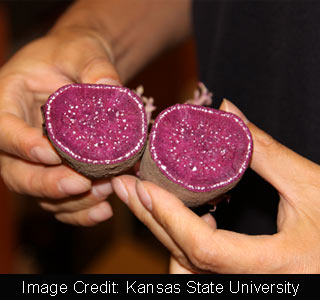
Apparently, these researchers were noted to have identified the Kansas-bred sweet potato’s possible pigment effect on the prevention of cancer. According to Lim the purple sweet potatoes are believed to have high contents of anthocyanin. This is apparently noted to be a tint that denotes the purple color in this vegetable, and this pigment is also believed to generate various colors depending on the chemical composition of the food.
Although, anthocyanin is believed to be epidemiologically linked with a lowered risk of cancer, the capability of the purple sweet potato to fight against cancer is notably still uncertain. Apparently, for this project a sweet potato was used which had a marked purple flesh and skin. This potato was believed to have been specially bred by Ted Carey, professor of horticulture, at K-State’s John C. Pair Horticultural Center in Haysville.
“Sometimes we can find purple sweet potatoes in the grocery store, but they don’t have this purple color on the skin and inside,” Lim said.
For the purpose of the research, three dissimilar purple sweet potatoes were believed to have been used which seemingly had different amounts of anthocyanin. Supposedly, Lim extracted the pigments from these veggies in order to measure the amount of anthocyanin in each potato. Further, these samples were believed to be injected into the HPLC-MS Analysis, which is apparently a method that is used to separate components.
On the basis of the flesh pigmentation and fiber contents, these potatoes were believed to have been separated by several traits. Furthermore, it’s believed that as compared to the other potatoes, the Kansas-bred potatoes may have considerably higher amounts of anthocyanin. They were even noted to have found two derivatives of anthocyanin that were dominant, namely cyanidin and peonidin.
Supposedly, the total phenolic content of the potatoes was also calculated by these experts. Phenols are noted to be the chemical compounds that are believed to possess anti-aging and antioxidant components. Apparently, in comparison with the regularly occurring purple sweet potatoes the Kansas-bred potatoes were noted to have a higher amount of phenolic content and antioxidant capacity.
Apparently, the K-State researchers also wanted to note the definite effects of cyandin and peonidin. Furthermore, human colon cancers with low concentrations of the pigment derivatives were believed to have been treated by Lim, who also studied the effects on the cell cycles.
Possibly, it was noted that cyanidin and peonidin seemed to have showed major cell growth inhibition for the cancer cells, but no major changes were seen in the cell cycles. Apparently an improved understanding of the Kansas-bred potato’s underlying mechanisms could possibly provide an insight into its health benefits.
This research was believed to have been presented at the Experimental Biology Meeting in New Orleans.
